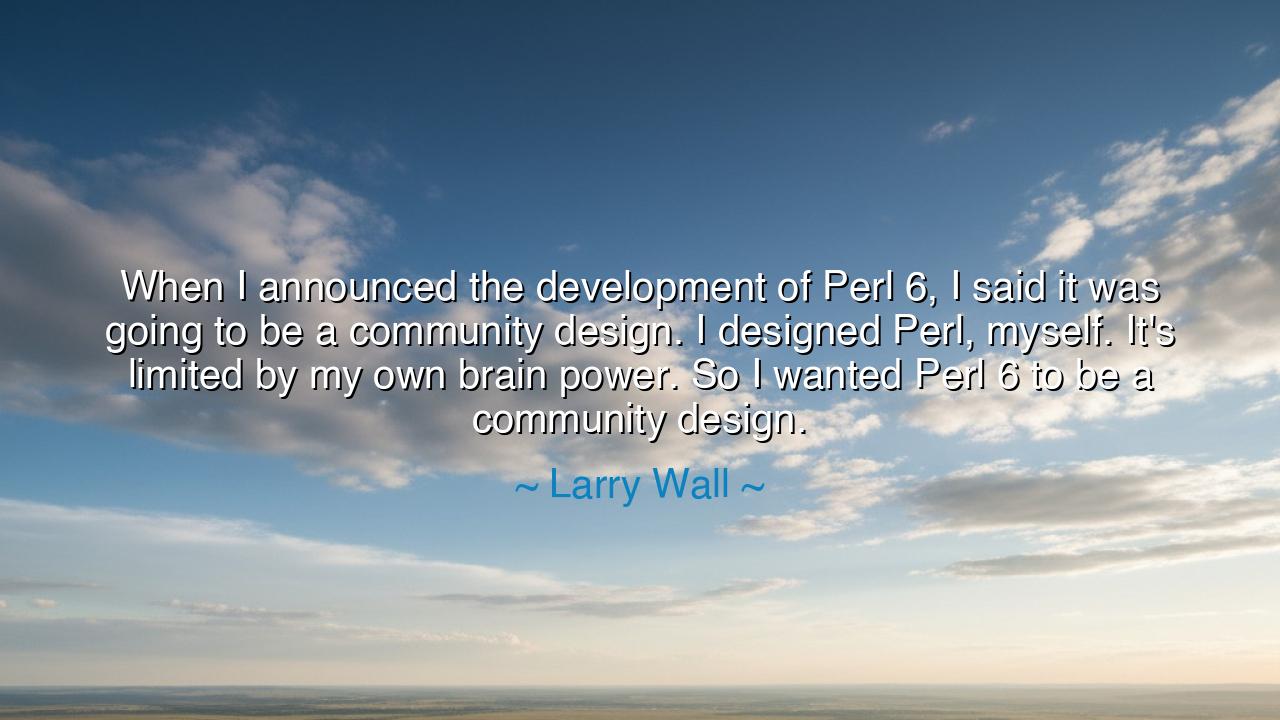
When I announced the development of Perl 6, I said it was going
When I announced the development of Perl 6, I said it was going to be a community design. I designed Perl, myself. It's limited by my own brain power. So I wanted Perl 6 to be a community design.






When Larry Wall, the creator of the programming language Perl, said, “When I announced the development of Perl 6, I said it was going to be a community design. I designed Perl, myself. It's limited by my own brain power. So I wanted Perl 6 to be a community design,” he was not merely speaking of software — he was speaking of wisdom, humility, and the evolution of creation itself. In these words, we hear the echo of a timeless truth: that the greatest works of humankind must one day outgrow their creator, and that true mastery lies in knowing when to share one’s power. Wall, in his humility, recognized what the ancients often taught — that an idea born of one mind is finite, but an idea nourished by many becomes eternal.
In the ancient world, such a philosophy would have been praised by the sages of Greece and the scholars of Alexandria. The builders of civilization understood that the strength of any creation lies not in the brilliance of one, but in the harmony of many. The Parthenon, though attributed to Phidias, rose not by his hand alone, but by the united skill of stonemasons, engineers, and artists. So too, when Larry Wall spoke of community design, he was invoking the same sacred principle — that to craft something enduring, one must allow the wisdom of the collective to flow into it. The lone inventor begins the path, but the community ensures it reaches the horizon.
Perl itself was a creation of genius — flexible, expressive, and full of life. But Wall knew the limits of solitary vision. “It’s limited by my own brain power,” he said — and in that simple confession lies the mark of true greatness. For the proud claim ownership; the wise invite collaboration. Wall’s acknowledgment that his mind could only take Perl so far was not a weakness, but a revelation. He understood that in the world of ideas, stagnation comes when ego guards the gate. To open that gate is to invite evolution. And so, Perl 6 was born not as a continuation of one man’s dream, but as a symphony of many voices, each adding new tones, new textures, new life.
This act mirrors one of the oldest lessons in human progress. Consider the Roman Republic, which rose not by the decree of kings but by the balance of many minds. The Romans believed that wisdom was best found in counsel — that no single man, however gifted, could perceive all ends. Their Senate, flawed though it was, embodied the belief that diversity of thought strengthens the foundation of creation. In this same way, Wall transformed a language into a living organism — one that could grow, adapt, and survive the changing seasons of technology. His choice to let go of total control was not the end of authorship; it was the beginning of legacy.
Yet, there is something deeply emotional, almost spiritual, in Wall’s realization. To create something from one’s mind is to give birth to a piece of one’s soul. To release that creation into the hands of others requires trust and surrender — an act as brave as it is selfless. It is the same courage that a teacher shows when allowing a student to surpass them, or a parent when watching a child chart their own course. Wall’s words teach us that the creator’s truest joy is not in ownership, but in witnessing the growth of their creation beyond their control.
Community, then, becomes the vessel through which individual brilliance achieves immortality. Alone, a creator can build something wondrous; together, a community can build something divine. The ancients said, “No man ever steps into the same river twice,” for both man and river are changed. Likewise, no idea remains pure in isolation — it must be shaped, challenged, and refined by others if it is to endure. Wall’s Perl 6 was not an abandonment of his vision, but its rebirth in the hands of humanity.
And so, let this be the lesson: share what you build, for the measure of creation is not how tightly we hold it, but how freely we let it grow. Collaboration is not the enemy of genius — it is its fulfillment. Do not fear the dilution of your vision; fear instead the stillness that comes from guarding it alone. Like Larry Wall, learn to say, “I have done what I can with my own mind; now let the many bring it to perfection.” For in this act lies the highest form of wisdom — the recognition that our greatest works are not ours alone, but the world’s gift to itself through us.






AAdministratorAdministrator
Welcome, honored guests. Please leave a comment, we will respond soon